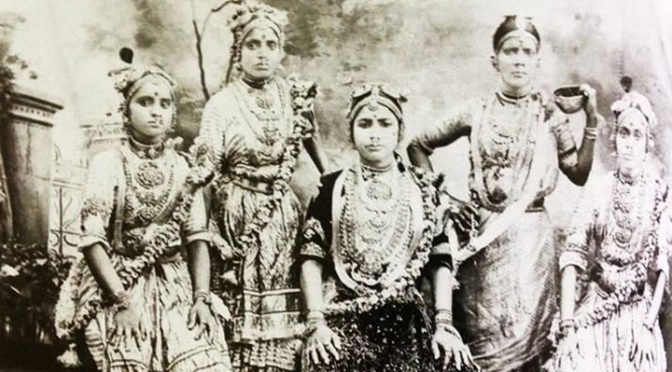DEVADASI: A CUSTOM ABROGATED BY LAW
Posted on : July 7, 2019Author : AGA Admin

Customs are patterns of behaviour that are adhered to, and recognized by the members of a society, family, tribe or community for a long period of time. They are practices that have become embedded in the social fabric of a particular community, and are now considered necessary to maintain the social dynamics most suitable for the well-being of the community. Customs, though a basic source of law, are often incompatible with changing times and scenarios.And in sucha scenario they can be abrogated by the law.
One such custom is that of the system of Devadasi. Etymologically, a Devadasi is a “Servant of God”, a custom of marrying young girls to deities of temples which can be traced back to the 7th century. Historically, Devadasis were held in high regard. They performed menial as well as administrative functions in temples and were economically independent. They also formed communities of artists who sang and danced in temples as an act of offering to God. They were credited with the preservation of dance forms such as Bharatanatyam. Unfortunately, with the advent of foreigners and decline in patronage, the status of Devadasis deteriorated to that of sex slaves.
Subsequently, young girls are often forced into prostitution under the garb of this practice which is particularly prevalent in Karnataka, Maharashtra and other parts of South India. As soon as the girl attains puberty, she is dedicated to a God or Goddesses and a “taker” is found for her. This is usually an older, wealthy man, who assents to take care of the girl’s family in exchange for her gratifying his sexual needs. Since girls are often pushed into this profession when they are as young as 12 years old, their ignorance about protection measures renders them exposed to sexually transmitted diseases like AIDS. The problem is amplified when religion is used to armour large-scale forced prostitution.
While tracing the trajectory of legal action in this regard, we can see that the custom of Devadasi was only considered problematic after the advent of British rule in India. Devadasis were a tightly- knit, matriarchal community who exercised more autonomy than other women in that period and capitalised their artistic skills to gain influence in the society. In 1882, a strong attack was launched against these women, who were now painted as prostitutes. An appeal was made, by reformists and intellectuals, to the Viceroy and Governor General of India and to the Governor of Madras. This appeal defines the position of the anti-nautch movement which labelled all devadasis as prostitutes and sought to delegitimize the social sanction given to them in the Hindu community.
In 1924 the Indian Penal Code was amended, and section 372 declared trafficking of minor girls an offence. The first direct reference against the practice of dedication to temples was made in 1934 when the Bombay Devadasi Protection Act was passed by the British Government. It made the practice of dedication illegal and prescribed punitive action for those involved in the dedication except for the Devadasi herself, and gave legal sanction to the marriages of Devadasis. Alongside the Bombay Devadasi Protection Act, the Madras Devadasi (Prevention of Dedication) Act, 1947 was also in operation in the then Mysore state. All these legislations criminalised the practice of Devadasi, but what they also did was disregard the consent of the woman involved. They declared it illegal irrespective of whether the girl consented to be a Devadasi. This marked the end of the flourishing artistic culture of Devadasis.
In 1956, Immoral Traffic (Prevention) Act was passed which made prostitution in public areas an offence. Certain specialised laws have also been enacted by state legislatures in order to curb this practice. For instance the state of Andhra Pradesh, where this practice is rampant, the Prohibition of Dedication Act has been enacted in 1988. The Supreme Court has affirmed, time and again, in various cases that individual dignity cannot be infringed under the garb of religious freedom. In the case of Vishal Jeet v Union of India, a PIL was filed to institute an enquiry against police officers under whose jurisdiction Devadasi and Jogin traditions were flourishing. Firstly, the Court reiterated the fundamental rights available in the constitution, namely Article 23 (1) of the constitution which prohibits traffic in human beings, in accordance with which the Suppression of Immoral Traffic in Women & Girls Act, 1956 (SITA for short) was enacted. It was also thought crucial to refer to the Article 39 of the constitution which is a Directive Principal Of State policy and says in clause (e) that the State should, in particular, direct its policy towards securing that the tender age of children are not abused and in clause (f) that the State should, in particular, direct its policy towards securing that children and youth are protected against exploitation and against moral and material abandonment. In light of these, it becomes immensely important to protect Devadasis, as they are mostly girls of tender age who are often pushed into the profession by their parents due to societal and economic pressures.
The court in this case issued directives to the state government to take prompt action against this practice and showed its dissatisfaction with the current deplorable condition of Devadasis despite legislations to the contrary. States were directed to enact legislations for protection of children against prostitution, set up advisory councils that look at rescue and rehabilitation of child prostitutes and to set up a central advisory body specifically to look at Devadasi and Jogin traditions.
Sardar Syedna Tahir Safiuddin Saheb v. State of Bombay is an important judgement in this regard. It recognized that religious freedom can be curtailed in interest of the society as whole and said that certain customs including the Devadasi system were toxic to the society and it is the duty of the legislature to enact laws to abolish these practices. It is said that if the constitution can provide freedom of religion, it can also provide freedom from religion as when religion becomes a source of threat to the liberty and dignity of an individual. The constitution provides for state interventions for socio-religious reform to curb evils that are perpetrated in the name of religion, such as the Devadasi system.
The SC has again consecrated the same view in the case of His Holiness Shrimad perarulla Ithiraja Ramanuja Jiyar Swarni v. State of Tamil nadu. This judgement stressed on the supremacy of public order and moral conduct over religious rights guaranteed in Article 25 of the constitution. It said that in a welfare state like ours, individual dignity and human values always supersede religious customs. Thus in a variety of cases enough emphasis was given on the need to abolish certain customs which have grown to become contrary to objective morality.
There are an estimated 2.5 lakh “Devadasi” girls who have been dedicated to Yellamma and Khandoba temples on Maharastra-Karnataka border. The principle reason why this practice continues to thrive is because of ignorance of law and lack of implementation mechanisms. In my opinion, we need a strong central policy on this issue that provides for mechanisms to deal with the issue from the grass-root level and prevent girls from being dedicated in the annual fairs that take place in temples.
Aakanksha Jadhav
Legal Intern
References
LalithaVakulabharanamWomen, Religion, and Tradition: The Cult of Jogins, Matangis and Basvis, Rawat Publications, 2011
Jogan Shankar,Devdasi Cult: A Sociological Analysis, Ashish Publishing House, 1990
- 372, Indian Penal Code
Vishal Jeetvs Union Of India AndOrs (1990) AIR 1412
Sardar SyednaTahir SafiuddinSaheb v. State of Bombay, AIR (1962) SC 853
Gulam Kadar Ahmadbhai Menon And Ors v. Surat Municipal Corporation And Ors. (1998) AIR GUJ 234
His Holiness ShrimadperarullaIthirajaRamanujaJiyarSwarni v. State of Tamilnadu, (1972) 2 SCC 11, Women and Child Commission Report





I have been reading the posts, and I definitely concur with what Tom said.
I completely agree with the above comment, the net is with a doubt growing into the a first-class number of important medium of communication across the globe and its due to sites like this that ideas are spreading so quickly. My best wishes, Alda.